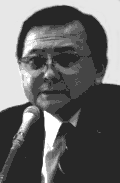Inouye bill gets raves, but powerful telecom firms hold their tongues
Though nobody showed up to call the bill unconstitutional, Inouye began building a defense.
Originally published in Current, July 4, 1994
By Steve Behrens
A deceptively harmonious panel of public-interest reps testified in the Senate June 22 [1994] in favor of reserved capacity for nonprofits and government on the information superhighway.
They supported some or all of the National Public Telecommunications Infrastructure Act of 1994, S. 2195, which had just been introduced a week earlier by subcommittee Chairman Daniel Inouye (D-Hawaii).
Among them, South Carolina ETV President Henry Cauthen declared, after he got warmed up, that Inouye's bill represents ''the most crucial decision this Congress may make in a long, long time.''
The panel's enthusiasm for reserved capacity was genuine--the bill at last has given nonprofits a hearing on the issue that America's Public Television Stations and other groups have sought for months.
But the picture in the hearing room was far from complete, lacking the lobbyists from industries whose future digital networks would have to reserve perhaps 20 percent of their capacity for nonpaying customers. Telephone and cable TV interests had been invited to testify, but had declined. (Further hearings will be held, Inouye said, but none have been scheduled so far.)
Though the U.S. Telephone Association chose not to speak on the bill in public, it did prepare testimony strongly opposing it. If enacted, USTA said in a text provided to Current, the Inouye act will unconstitutionally deprive phone companies of system capacity worth $100 billion. That ''taking'' would also discourage the investment necessary to build new digital networks, USTA said. The association said it would prefer to see all telecom companies contribute to a universal service fund that would ''ensure the availability'' of advanced services to public schools, hospitals and libraries.
Industry opposition may affect whether Inouye succeeds in integrating his bill into the Senate's big infohighway bill, S. 1822, which re-regulates both the telephone and cable industries. (A counterpart bill, H.R. 3636, passed the House 423-4 on June 28.)
The only ''nay'' heard in the hearing came from Sen. Conrad Burns (R-Mont.), the only senator besides Inouye who showed up on a very busy legislative day.
Burns said he fears that Inouye's bill would discourage companies from wiring sparsely populated areas like his state. Instead of disincentives, telecom companies need incentives to build the infrastructure, he said.
Though Burns heartily endorsed distance learning, he doubted the need for the bill. ''We have great things happening in Montana without this law,'' he said, and referred to a multisite educational video hookup that operates six hours a day.
Though nobody showed up to call the bill unconstitutional, Inouye began building a defense. He reported that legal advisors at the Congressional Research Service had concluded it ''is likely to withstand review by the courts.''
Prof. Monroe E. Price of Cardozo School of Law at New York City's Yeshiva University, agreed that the bill would survive challenge, and further testified that the courts would not regard a 20 percent reservation as confiscatory. ''It seems to me clear that 20 percent probably is not out of line,'' he said, ''looking at the history of [earlier] public right-of-way negotiations.''
Price applauded Inouye for not being stymied by the widespread uncertainty about the ultimate shape of the new media. ''This legislation has the boldness of acting, but the flexibility of delegation,'' Price's statement said. The bill delegates many specific decisions to the FCC.
As Inouye quizzed the panelists, they responded with the certainty of believers.
Andrew Blau, director of the Benton Foundation's Communications Policy Project, noted that telecom companies are already boasting about the ''cornucopia of great public benefits'' that will come rolling down the superhighway. He said Inouye's bill ''simply creates a mechanism that assures we will get what we're told we will get.''
Cauthen told Inouye he thinks the digital infrastructure shouldn't be developed at all if it excludes segments of society. ''We should not make these highways tollroads for those who need them most and can least afford them,'' he said.
Anthony Riddle, chair of the Alliance of Community Media, representing local cable access programmers, looked back into history for ''a dramatic representation of what's really at stake here.'' He produced an example of total communication failure for part of the population: the black people of Texas who continued working as slaves for two-and-a-half years after the Emancipation Proclamation because they hadn't heard the news.
The Instructional Telecommunications Council fully supports ''the concept'' of reserved capacity, said George Connick, ITC spokesman and president of the University of Maine at Augusta. But Connick later suggested that in dealing with digital services, it may be appropriate for Congress to consider other mechanisms such as preferential or guaranteed rates instead.
''Basically, our position comes down to the fact that our colleges and other public institutions do not have the resources to outbid private industry for channels on the information superhighway,'' Connick said in a statement.
Hawaii State Sen. Carol Fukunaga told Inouye that some distance-learning projects in their state are going well, but carriers are now asking schools to pay for transmission, which has ''staggered'' educators with new costs.
. To Current's home page . Earlier news: Inouye puts reservation concept in a bill, 1994. . Later news: Senate committee cuts back Inouye's 20 percent reservation to 5 percent, 1994.
Web page created Sept. 25, 1995
Current
The newspaper about public television and radio
in the United States
A service of Current Publishing Committee, Takoma Park, Md.
E-mail: webcurrent.org
301-270-7240
Copyright 2000

